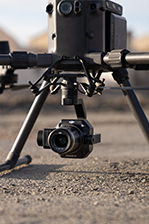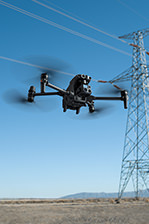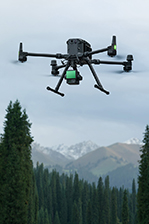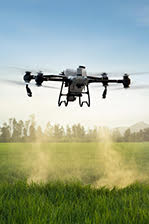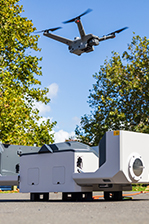DJI Focus Pro Creator Combo
Feel the Focus
AMF Lens Control System
DJI Focus Pro, DJI's first independent Automated Manual Focus (AMF) lens control system, provides cinematographers with a robust and comprehensive focus solution, ushering in a new era of human-machine collaborative focus control.
LiDAR Focusing, Now Accessible to All
For the first time, DJI introduces a LiDAR focus system as an independent product, allowing an extensive user base to experience the freedom of creative focusing possibilities.
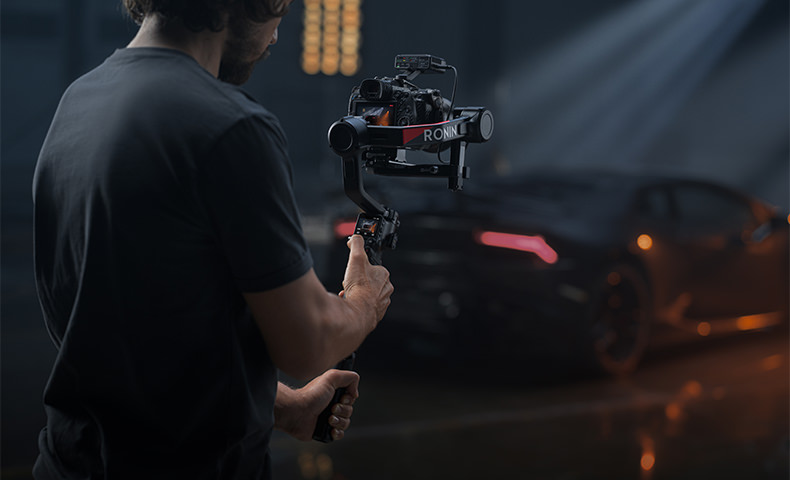
All-New Grip, All-Around Capability
The newly designed DJI Focus Pro Grip features a 2.5-hour system power supply, intuitive screen operations, auto-calibration and data storage for 15 lenses, Bluetooth start/stop recording, and handheld shooting capabilities, offering an exceptional LiDAR focusing experience, even without a Ronin stabiliser.
Touchscreen Parameter Adjustments, LiDAR View Synchronisation
The Grip, equipped with a full-colour touchscreen, supports the adjustment of LiDAR and motor parameters and can present a real-time view from the LiDAR's perspective, granting operators complete awareness during use.
Auto Calibration, Efficient and Convenient
The DJI Ronin app features built-in lens data that can be imported into the Focus Pro Motor via Bluetooth connection to the Grip. A single Motor can store data for up to 15 lenses.
Bluetooth Connectivity, Wireless Control
The Grip can directly connect to mirrorless cameras via Bluetooth for wireless start/stop recording. It can also pair with the DJI Ronin app over Bluetooth to complete the calibration of manual lenses. [1]
2.5-Hour Operating Time, Use While Charging
The Grip supports a 2.5-hour power supply for both the LiDAR and focus motor. It also allows for continuous use while charging through third-party PD fast-charging batteries.
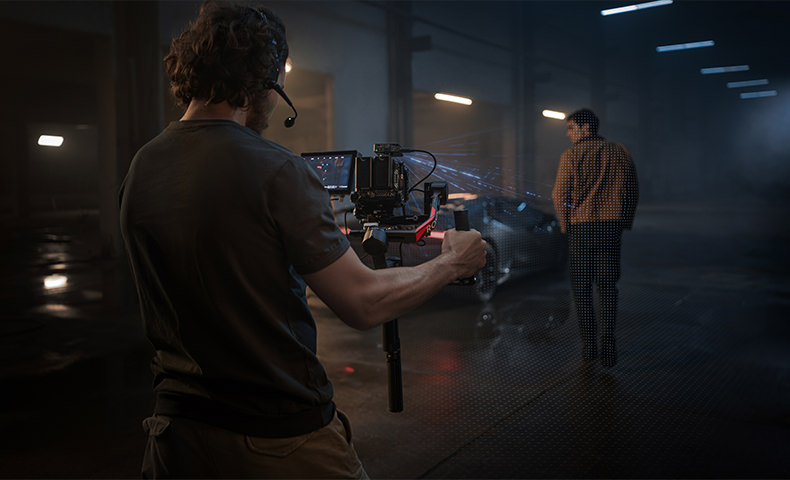
Advanced Autofocus, A Leap Ahead
Further and Wider Focusing
LiDAR human-subject focus distance is now extended to 20 metres, [2] approximately three times that of the previous generation, [3] effortlessly handling shooting with telephoto lenses.
A super-wide focus FOV of 70° easily accommodates edge compositions and close-up shots, significantly enhancing creative freedom.
More Accurate and Stable Focusing
The upgraded LiDAR now boasts 76,800 ranging points, a leap of 77% over the previous generation, [3] sharpening human-subject edge detection while effectively reducing focus hunting. In addition, with a LiDAR refresh rate of 30 Hz, focus reliably locks on even when the subject is moving quickly.
More Intelligent Focusing
AF Subject Recognition and Tracking
With the assistance of new AI algorithms, more reliable recognition of human subjects and vehicles can be achieved. Even if the subject is momentarily obscured, the LiDAR can quickly regain focus.
AF Subject Switching
In multiple-subject scenarios, focus can be quickly transitioned among various subjects.
Adjustable AF Focus Speed
The autofocus speed is adjustable across five levels. Lower levels produce a softer focus effect, while higher levels enable quicker, more sensitive focusing.
Selectable AF Focus Area
Two focus area modes, Wide and Flex Spot, are available. In Wide mode, the LiDAR can automatically detect and focus on human subjects and vehicles. In Flex Spot mode, users have the freedom to manually select any object to focus on.
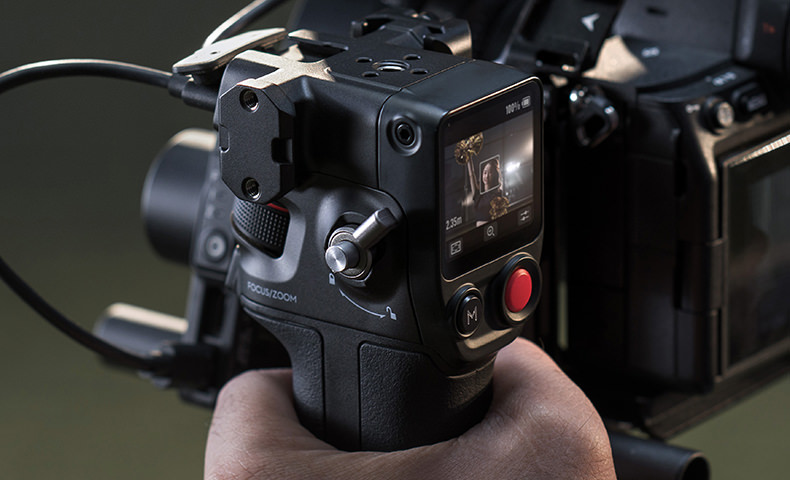
Flexible Combinations for Diverse Scenarios
Focus Pro consists of four major modules: LiDAR, Motor, Grip, and Hand Unit. Cinematographers can flexibly combine these modules based on different shooting demands.
Solo cinematographers can utilise LiDAR autofocus to significantly improve shooting efficiency, ensuring standout creative results. Collaborative teams can bring depth to their visual storytelling through precise focus control with the Hand Unit. Focus Pro boasts robust capabilities, accommodating a diverse array of shooting scenarios and genres.
AMF, Human-Machine Collaboration
With the groundbreaking AMF mode applied for the first time in both the Hand Unit and the Grip, DJI Focus Pro sets a new standard for human-machine collaboration in focus control, catering to a diverse range of creative demands.
Focus You Can Feel
In AMF mode, as the autofocus operates, the front dial on the Grip (or the focus knob on the Hand Unit) rotates simultaneously. This allows cinematographers to both visually observe the focus status on the monitor and to intuitively perceive the autofocus logic through tactile feedback from their fingertips, enabling prompt decisions on when to manually intervene.
Millisecond-Level Switching between Manual and Auto
Focus control is always at your fingertips. In AMF mode, manual focus control can be engaged and disengaged in milliseconds. This not only captures the operator's intent with enhanced precision, ensuring coherent visual storytelling, but also significantly boosts on-set efficiency by reducing disruptions due to focus mode changes.
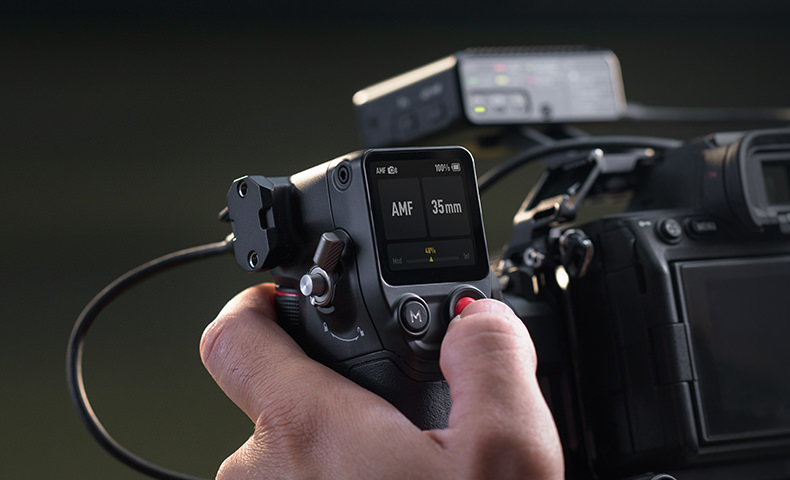
Dynamic Focus, Best of Both Worlds
The innovative AMF feature enables limitless creative possibilities. In AMF mode, the LiDAR, together with human intervention, yields a focus experience that's as elegant and dynamic as it is efficient and convenient. It is a seamless hybrid experience that combines the power and reliability of technology with the intuition and creativity of human operators.
Rotate the dial to achieve AMF focus transition, ideal for narrative scenes.
Press and hold the dial steady to achieve AMF focus lock, ideal for scenes with foreground obstructions.
Focus Assistance with a Bird's-Eye View
Empowered by the DJI Focus Pro LiDAR, cinematographers can gain a more intuitive understanding of a subject's spatial position and utilise the LiDAR Waveform focus assistance [4] through the DJI High-Bright Remote Monitor, achieving a bird's-eye view of the entire scene.
In addition, LiDAR Waveform offers supplementary information like subject position, a real-time focal plane reference line, and distance scale, which help evaluate the autofocus status and anticipate the optimum moment for manual intervention.
FIZ Lens Control, Master the Scene
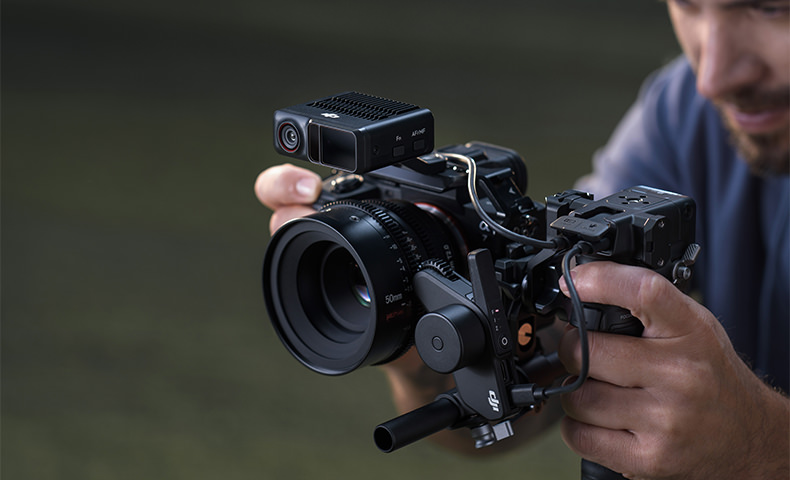
FIZ Motor
Motor performance has significantly improved, offering more precise control for professionals and more versatile cinematic language opportunities.
One-Button Linking
It supports one-button linking with the Hand Unit, eliminating the manual linking process for quicker startup and use.
10ms Low Latency
The motor speed is approximately 30% faster than the previous generation, [6] with a response latency of just 10 milliseconds.
Three-Level Adjustable Torque
Motor torque can be adjusted to match the focus gear ring tightness of different lenses, ensuring a smoother operation.
Adjustable Rotation Direction
Motor rotation direction can be adjusted flexibly according to different mounting positions.
Compatible With 15mm Rods
More versatile in size for more convenient mounting.
Magnetic Damping Grip
One operator can embody an entire team. Cinematographers can smoothly switch between focus and zoom control for an intuitive and effective control experience.
Focus Control
Focus can be easily adjusted by operating the front dial of the Grip. Dial speed can be set from 1 to 100 to tailor the rotational range as needed.
Zoom Control
The front dial can be switched to zoom control, facilitating rapid manipulation of the lens's focal length to achieve more dynamic lens operation.
Magnetic Damping Tactile Feedback
In Focus mode, the damping coefficient is adjustable. In Zoom mode, the dial shifts from a damping feel to a spring-back feel.
Notes:
1.For more compatibility information, click Camera & Lens Compatibility in the navigation bar of this page.
2.Requires enabling the 2x zoom display function on the DJI Focus Pro Grip screen.
3.Compared with the DJI LiDAR Range Finder (RS). Data was measured in a controlled environment. Actual experience may vary depending on the environment, usage, and firmware version.
4.Requires the DJI Focus Pro LiDAR to DJI Transmission Cable Hub, as well as DJI Transmission (High-Bright Monitor Combo).
5.Measured with FCC compliance in an open, unobstructed environment without interference. This data is for reference only. Actual transmission distance may vary depending on the environment.
6.Compared with the DJI RS Focus Motor (2022). The motor speed may vary depending on the lens damping. Please refer to the actual experience. Data was measured in a controlled environment. Actual experience may vary depending on the environment, usage, and firmware version.
7.Setting up the shooting solution requires one or more accessories that are sold separately.
8.The LiDAR Waveform focus assistance feature is only available in single-motor scenarios.
Product Specifications
LiDAR
Accessory Port: Cold Shoe
1/4"-20 Threaded Hole
USB-C Firmware Update Port (Power/USB)
USB-C Data Port (Power/CVBS/CAN)
Image Sensor: Resolution: 1920×1440
FOV:
57.4° (horizontal), 44.6° (vertical), 70.1° (diagonal)
Frame Rate: 30fps
Equivalent Focal Length: 30 mm
ToF Sensor: Ranging Points: 76,800
Sensing Range: 0.5-20 m
FOV:
Wide-Angle Mode: 65° (horizontal), 40° (vertical), 76.1° (diagonal)
Telephoto Mode: 20° (horizontal), 20° (vertical), 28.3° (diagonal)
Frame Rate: 30fps
Equivalent Focal Length: 30 mm (wide-angle mode)
Ranging Accuracy: ±1% to 3% (affected by the distance)
Machine Learning: Tracking Subject: Can recognize up to five subjects at the same time, and choose one to follow
Smart Object Identification: Human, vehicle
Focus Area: Flex Spot (activate focus lock by framing the subject and pressing the trigger; supports autofocus only, not ActiveTrack); Wide (when subject-locked on human, supports both autofocus and ActiveTrack*; when subject-locked on vehicle, supports autofocus only, not ActiveTrack)
* ActiveTrack is available only when used in conjunction with DJI RS 4 Pro or DJI RS 3 Pro.
Electrical Properties: Power Consumption: Average approx. 6.3 W, max 6.8 W
Input Voltage: 6.6-17.2 V
Operating Temperature: -20° to 45° C (-4° to 113° F)
Mechanical Properties: Main Body Dimensions: Approx. 68×25×57 mm (L×W×H)
Weight: Approx. 140 g (0.31 lbs)
Mounting Method and Position: Can be mounted directly via cold shoe or using the 1/4" threaded hole
It is recommended to mount the DJI Focus Pro LiDAR close to the camera's optical axis.
Grip
Operating Frequency: 2.400-2.4835 GHz
Bluetooth Transmitter Power: < 8 dBm
Mechanical Properties: Main Body Dimensions: Approx. 59×73×162 mm (L×W×H)
Main Body Weight: Approx. 482 g (1.06 lbs)
Mounting Method: Flexible mounting on either left or right side of the cage via NATO port
Screen: 1.8-inch full-color touchscreen
Port: USB-C Port (DJI Focus Pro LiDAR)
USB-C Port (DJI Focus Pro Motor)
USB-C Port (Camera Control Port)
USB-C Port (Battery Charging Port)
Operating Time: Approx. 2.5 hours
Measured in a 25° C (77° F) environment while simultaneously powering the grip, LiDAR, and a focus motor, with AF continuously on, and paired with a manual lens.
Charging Power: Supports 18W PD fast charging
Battery Model: BHX711-3000-7.2V
Power Supply Voltage: 6.6-8.4 V
Operating Temperature: -20° to 45° C (-4° to 113° F)
Hand Unit
Operating Frequency: 2.400-2.4835 GHz
Bluetooth Transmitter Power: < 8 dBm
2.4GHz Transmitter Power (EIRP): < 20 dBm (CE/SRRC/MIC)
< 26 dBm (FCC)
2.4GHz Transmission Distance: 160 m*
100 m**
* Measured under FCC standard in an unobstructed environment free of interference.
** Measured under CE/SRRC/MIC standards in an unobstructed environment free of interference.
Mechanical Properties: Dimensions: Approx. 128×87×87 mm (L×W×H)
Weight: Approx. 555 g (1.22 lbs) (without battery)
Battery: Model: NP-F550
Input: 6.3-8.4 V
Dimensions: 71×38.6×21.1 mm (L×W×H)
Screen: 1.09-inch full-color touchscreen
Static Power Consumption: 0.83 W
Operating Temperature: -20° to 45° C (-4° to 113° F) (excluding battery temperature)
Motor
2.4GHz Transmitter Power (EIRP): < 20 dBm (CE/SRRC/MIC)
< 26 dBm (FCC)
2.4GHz Transmission Distance: 160 m*
100 m**
* Measured under FCC standard in an unobstructed environment free of interference.
** Measured under CE/SRRC/MIC standards in an unobstructed environment free of interference.
Mechanical Properties: Dimensions: Approx. 100×61×34 mm (L×W×H)
Weight: Approx. 123 g (0.27 lbs)
Rod Diameter: 15 mm
Output Gear Teeth: 30
Output Gear Module: 0.8
Performance: Max Torque: 0.6 N·m (8 V)
Max Speed: 300 rpm (8 V)
Power Supply Voltage: 6.6-17.2 V
Stall Current: 2 A, 8 V
Free Current: 60 mA, 8 V
Operating Temperature: -20° to 45° C (-4° to 113° F)
Output Voltage: 6.6-17.2 V
In the box
DJI Focus Pro LiDAR × 1
DJI Focus Pro Grip × 1
DJI Focus Pro Motor × 1
DJI Focus Pro Carrying Case × 1
WHY BUY FROM US?
By buying from Ferntech, you'll have the confidence that you are dealing directly with New Zealand's leading drone experts. Our staff are knowledgable drone pilots who offer expert advice, trusted support and superior specialist service. Only through us will you receive a full New Zealand warranty, phone and email support, and access to our certified Repairs Centre with DJI-qualified drone technicians. And we guarantee that we will have the best prices on the market — if not let us know and we will match any price (conditions apply).
Warranty Details
System
How can I determine if the Hand Unit and Focus Pro Motor have been successfully linked?
You can determine whether the Hand Unit and Motor have been successfully linked by observing the status indicator on both devices. A yellow light indicates linking is in progress; a red light indicates linking has failed; a green light indicates linking has succeeded.
How do I update the firmware of the DJI Focus Pro Grip, Hand Unit, LiDAR, and Motor?
You can update the firmware of the LiDAR by connecting it to a computer and using DJI Assistant 2 (Ronin Series).
You can update the Grip or Hand Unit by connecting it to a smartphone and using the DJI Ronin app.
For the Motor, connect it to the Grip or Hand Unit first, then update the firmware via the Grip or Hand Unit and the DJI Ronin app.
After the DJI Focus Pro Grip, LiDAR, and Motor have been properly installed, if I replace the Motor, do I need to recalibrate the lens?
Yes.
What is the priority for focus control when using the DJI Focus Pro Hand Unit, Motor, LiDAR, and Grip simultaneously?
The Hand Unit has the highest priority for focus control. When the Hand Unit is powered on, the Motor will prioritize commands from the Hand Unit first.
What should I do if the camera view is still not clear after calibrating the lens?
Make sure that the installation distance and the flange distance are correctly adjusted and then recalibrate the lens.
LiDAR
What does installation distance mean?
Installation distance refers to the distance between the image sensor plane of the camera and the glass surface of the LiDAR.
How do I measure the installation distance for the LiDAR?
Use the scale on the focus card to measure the distance from the image sensor plane of the camera to the glass surface of the LiDAR.
What are the differences in the LiDAR's focus distance and the camera view's equivalent focal length in 1x and 2x modes?
In 1x mode, the focus distance ranges from 0.5 meters to 10 meters with an equivalent focal length of 30 millimeters.
With the 2x zoom display function enabled, the focus distance ranges from 0.5 meters to 20 meters.
Why does my LiDAR only focus up to 10 meters at the furthest? How can I achieve a distance of 20 meters?
By default, in 1x mode, the LiDAR's ToF sensor operates within a 10-meter sensing range. To extend to a 20-meter focus distance, you can tap the + icon on the Grip's screen to enable 2x zoom display.
What is the difference between the DJI Focus Pro LiDAR and the DJI LiDAR Range Finder (RS)?
The DJI Focus Pro LiDAR features a longer sensing range, more ranging points, and more intelligent subject recognition capabilities, resulting in an improved focusing experience.
What are the usage conditions for the LiDAR?
It should be used for diffusely reflective, large, and high-reflectivity objects (reflectivity > 10%). It is not suitable for directly focusing on glass surfaces or for use in heavy smoke or foggy conditions.
How do I install the LiDAR on the 1/4" screw hole of a cage?
First, use a flathead screwdriver to remove the 1/4" screw from the LiDAR mounting plate. Then, remove the cold shoe plate and attach the LiDAR to the screw hole on the cage using the 1/4" screw. Additionally, for the convenience of the users, the 1/4" screw on the LiDAR mounting plate is not fixed with threadlocker. If you notice any looseness during use, you can tighten the screw with a flathead screwdriver.
What should I do if the LiDAR's close-range focusing is inaccurate within the lens's supported minimum focusing distance?
It is recommended to use the manual calibration method. Calibrate at a distance of 0.5 meters at the first calibration point (0.5 to 1.5 meters). This allows for more accurate close-range focusing.
How can I calibrate to make long-distance focusing more accurate?
It is recommended to use the two-point calibration method. Calibrate at a distance of 5 meters at the second calibration point (4 to 5 meters). This allows for more accurate long-distance focusing.
Grip
In Wide mode, what does each color of the intelligent recognition box represent?
1. A white box indicates a subject that has been recognized and is being continuously focused on.
2. A gray box indicates a subject that has been recognized but is not being focused on.
3. A yellow box indicates a subject that has been recognized and is being locked onto for focus.
4. A red box indicates a subject that is about to lose its tracking status.
How do I use the Grip to control camera recording via Bluetooth?
Enable the Bluetooth function on both the camera and the Grip, and then tap to link them. Once the linking is successful, the Grip can be used to control camera recording. For more compatibility information, click Camera & Lens Compatibility in the navigation bar of the product page on the official DJI website.
Does the Grip support power supply from other batteries?
The Grip only supports power supply from the BG21 Battery Grip, which is interchangeable with the battery grips for DJI RS 3 and DJI RS 4.
What is the function of the USB-C port on the right side of the Grip's screen?
The USB-C port on the right side of the Grip's screen is a camera control port, which can be used to control the camera shutter.
How do I use the Grip to calibrate the Focus Pro Motor?
By pressing the trigger and M button simultaneously, you can quickly calibrate the Motor.
Is it necessary to install a cage on the camera before mounting the Grip?
Most cameras require the installation of a cage before mounting the Grip.
In AF mode, how do I switch the autofocus subject via the Grip?
In multi-person scenes, you can switch the autofocus subject by rotating the front dial on the Grip.
In AMF mode, is it possible to switch the autofocus subject via the Grip?
Switching subjects is not supported in AMF mode.
Hand Unit
What are the battery specifications required for the Hand Unit?
The Hand Unit utilizes the NP-F550 battery model commonly available on the market. The dimensions should be 71×38.6×21.1 mm (L×W×H). Make sure to purchase batteries according to these specified dimensions.
What should I do if the battery in the Hand Unit is difficult to remove or cannot be removed?
Due to significant differences in NP-F550 battery specifications on the market, if you encounter a situation where a battery is difficult to remove or cannot be removed, try gently tapping the Hand Unit to dislodge the battery.
How do I use the Hand Unit to control camera recording via Bluetooth?
On the touchscreen home page, swipe down to access the settings interface, select Bluetooth, and tap to pair with a camera that has Bluetooth enabled. Once paired, you can control camera recording through the Hand Unit. For more compatibility information, click Camera & Lens Compatibility in the navigation bar of the product page on the official DJI website.
How can I quickly adjust the damping of the Hand Unit?
Press and hold the trigger to enter damping adjustment on the Hand Unit, then rotate the focus knob to adjust the damping intensity.
Why does the Hand Unit spring back to a specific position after the damping adjustment is completed?
When you press and hold the trigger to adjust the damping, the Hand Unit automatically stores its last set focus position. After the adjustment is completed, the Hand Unit will automatically revert to this memorized focus position.
How do I link the Hand Unit with the Focus Pro Motor?
Press and hold the M button on the Hand Unit to start linking, or go to the touchscreen settings interface and select Link Motor to enter linking mode. You can also press and hold the function button on the Motor to trigger the linking process.
How do I use the Hand Unit to calibrate the Focus Pro Motor?
By pressing the trigger and M button simultaneously, you can quickly calibrate the Motor.
What is the radio frequency (RF) band of the Hand Unit? Will it be interfered with by RF devices such as video transmission systems?
The Hand Unit operates in the 2.4GHz RF band and there is a possibility that it could be interfered with by other 2.4GHz devices.
If you use it with the DJI High-Bright Remote Monitor, make sure to set the monitor's RF band to 5.8GHz/DFS to minimize the chances of interference.
How do I set and clear A/B points?
Press the A/B button once to set point A, and then rotate the focus knob to a desired distance and press the A/B button again to set point B. To clear the A/B points, press the A/B button again.
What is the function of the trigger on the back of the Hand Unit?
1. Pressing and holding the trigger allows for rapid adjustment of the Hand Unit's damping.
2. When using the LiDAR for focus assistance, the trigger can be used to lock onto the focus subject.
What is the function of the electronic contact pad on the top of the Hand Unit?
The electronic contact pad allows connection to the DJI High-Bright Remote Monitor via the DJI High-Bright Remote Monitor Holder.
What are the battery discharge requirements for the Hand Unit?
To ensure the Hand Unit operates properly, it is recommended that the batteries used should be capable of a discharge current greater than 2.5 A and maintain a voltage of no less than 6.3 V in an ambient temperature range of -20° to 45° C (-4° to 113° F).
Focus Motor
Does the Focus Pro Motor support reverse rotation? How can I set it?
The Motor supports reverse rotation, which can be set via the touchscreen on either the Grip or Hand Unit.
Grip:
Swipe up from the bottom of the touchscreen home page to enter the settings interface of the Grip. Enable the Reverse Dial function, and the rotation direction of the Motor will be reversed accordingly.
Hand Unit:
Swipe down from the top of the touchscreen home page to enter the settings interface. Select Invert Function Buttons Direction to set the reverse control direction for the focus knob, iris slider, and zoom stick.
Does the Focus Pro Motor support third-party power supply?
The Motor is compatible with third-party batteries for power supply, and the voltage range supported is 2S-4S (7.4-14.4 V). It is recommended to use the official D-TAP to USB-C Power Cable to connect to third-party batteries.
What is the purpose of the FIZ stickers?
The FIZ stickers can be applied to different motors to distinguish their functions.
What do the different indicator lights on the Focus Pro Motor indicate?
Solid Red: Powered on but not linked.
Solid Green: Powered on and successfully linked.
Solid Yellow: In the process of linking.
Flashing Red or Green: Motor range has not been calibrated.
How do you switch between the F, I, and Z channels on the Focus Pro Motor?
Simply press the Motor's function button to switch between the F, I, and Z channels.
Where are the lens calibration files (data) stored?
They are stored in the Focus Pro Motor.
App
What is the flange distance?
The flange distance is the distance between the lens and the camera's image sensor. Since camera mounts vary or adapters of different models may be used, the same lens can have different flange distances. As a result, after calibrating the lens in the DJI Ronin app, it is necessary to adjust the flange distance according to the actual camera view to eliminate focus discrepancies that may arise due to the use of different camera mounts or adapters.
When should the flange distance be adjusted?
If the camera view remains unclear after lens calibration, try adjusting the flange distance.
Adjustment Method:
1. To adjust the flange distance, it is recommended to use the focus card included in the box as a shooting subject.
2. Observe the clarity of the camera view against the focus card and enter the flange distance adjustment page in the DJI Ronin app. Then, finely adjust by tapping the + or - icon.
3. When the camera view has become clear, it indicates that the flange distance has been properly set.
There's currently no reviews for this product, be the first to write one.









